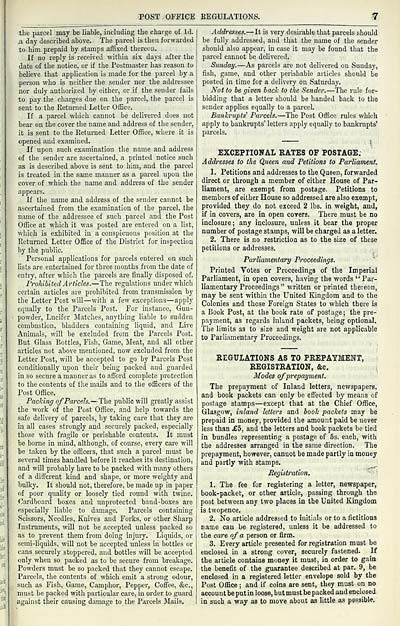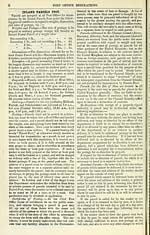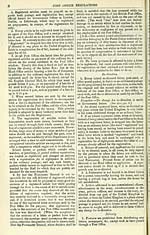Download files
Complete book:
Individual page:
Thumbnail gallery: Grid view | List view

POST . OFFICE EEGULATIONS.
the parcel may be liable, including the charge of Id.
.a day described above. The parcel is then forwarded
to him prepaid by stamps affixed thereon.
If no reply is received within six days after the
date of the notice, or if the Postmaster has reason to
believe that application is made for the parcel by a
person who is neither the sender nor the addressee
nor duly authorized by either, or if tlie sender fails
to pay the charges due on the parcel, the parcel is
sent to the Eeturned Letter Office.
If a parcel which cannot be delivered does not
bear on the cover the name and address of the sender,
it is sent to the Returned Letter Office, where it is
opened and examined.
If upon such examination the name and address
of the sender are ascertained, a printed notice such
as is described above is sent to him, and the parcel
is treated in the same manner as a parcel upon the
cover of which the name and address of the sender
appears.
If the name and address of the sender cannot be
ascertained from the examination of the parcel, the
name of the addressee of such parcel and the Post
Office at which it was posted are entered on a list,
which is exhibited in a conspicuous position at the
Returned Letter Office of the District for inspection
by the public.
Personal applications for parcels entered on such
lists are entertained for three months from the date of
entry, after which the parcels are finally disposed of.
Prohibited Articles. — The regulations under which
certain articles are prohibited from transmission by
the Letter Post will — with a few exceptions — apply
equally to the Parcels Post. For instance, Gun-
powder, Lucifer Matches, anything liable to sudden
combustion, bladders containing liquid, and Live
Animals, will be excluded from the Parcels Post.
But Glass Bottles, Fish, Game, Meat, and all other
articles not above mentioned, now excluded from the
Letter Post, will be accepted to go by Parcels Post
conditionally upon their being packed and guarded
in so secure a manner as to aff'ord complete protection
to the contents of the mails and to the officers of the
Post Office.
Packing of Parcels. — The public will greatly assist
the work of the Post Office, and help towards the
safe delivery of parcels, by taking care that they are
in all cases strongly and securely packed, especially
those with fragile or perishable contents. It must
be borne in mind, although, of course, every care will
be taken by the officers, that such a parcel must be
several times handled before it reaches its destination,
and will probably have to be packed with many others
of a different kind and shape, or more weighty and
bulky. It should not, therefore, be made up in paper
of poor quahty or loosely tied round with twine.
.Cardboard boxes and unprotected band-boxes are
especially liable to damage. Parcels containing
Scissors, Needles, Knives and Forks, or other Sharp
Instruments, will not be accepted unless packed so
as to prevent them from doing injury. Liquids, or
semi-liquids, will not be accepted unless in bottles or
cans securely stoppered, and bottles will be accepted
only when so packed as to be secure from breakage.
Powders must be so packed that they cannot escape.
Parcels, the contents of which emit a strong odour,
such as Fish, Game, Camphor, Pepper, Colfee, &c.,
must be packed with particular care, in order to guard
against their causing damage to the Parcels Mails,
■It is very desirable that parcels should
be fully addressed, and that the name of the sender
should also appear, in case it may be found that the
parcel cannot be delivered.
Sunday. — As parcels are not delivered on Sunday,
fish, game, and other perishable articles should be
posted in time for a delivery on Saturday.
Not to he given back to the Sender. — The rule for-
bidding that a letter should be handed back to the
sender applies equally to a parcel.
Bankrupts^ Parcels. — The Post Office rules which
apply to bankrupts' letters apply equally to bankrupts'
parcels.
EXCEPTIONAL BATES OF POSTAGE.
Addresses to the Queen and Petitions to Parliament.
1. Petitions and addresses to the Queen, forwarded
direct or through a member of cither House of Par-
liament, are exempt from postage. Petitions to
members of either House so addressed are also exempt,
provided they do not exceed 2 lbs. in weight, and,
if in covers, are in open coyers. There must be no
inclosure; any inclosure, unless it bear the proper
number of postage stamps, will be charged as a letter.
2. There is no restriction as to the size of these
petitions or addresses.
Parliamentary Proceedings. *^
Printed Votes or Proceedings of the Imperial
Parliament, in open covers, having the words " Par-
liamentary Proceedings " written or printed thereon,
may be sent within the United Kingdom and to the
Colonies and those Foreign States to which there is
a Book Post, at the book rate of postage ; the pre-
payment, as regards inland packets, being optional.
The limits as to size and weight are not applicable
to Parliamentary Proceedings.
EEGULATIONS AS TO PREPAYMENT,
EEGISTRATION, &c.
Modes of prepayment.
The prepayment of Inland letters, newspapers,
and book packets can only be efiected by means of
postage stamps — except that at the Chief Office,
Glasgow, inland letters and hook packets may be
prepaid in money, provided the amount paid be never
less than £5, and the letters and book packets be tied
in bundles representing a postage of 5s. each, with
the addresses arranged in the same direction. The
prepayment, however, cannot be made partly in money
and partly with stamps.
1. The fee for registering a letter, newspaper,
book-packet, or other article, passing through the
post between any two places in the United Kingdom
is twopence.
2. No article addressed to initials or to a fictitious
name can be registered, unless it be addressed to
the care of a person or firm.
3. Every article presented for registration must be
enclosed in a strong cover, securely fastened. If
the article contains money it must, in order to gain
the benefit of the guarantee described at par. 9, be
enclosed in a registered letter envelope sold by the
Post Office ; and if coins are sent, they must on no
account be put in loose, but must be packed and enclosed
in such a way as to move about as little as possible.
the parcel may be liable, including the charge of Id.
.a day described above. The parcel is then forwarded
to him prepaid by stamps affixed thereon.
If no reply is received within six days after the
date of the notice, or if the Postmaster has reason to
believe that application is made for the parcel by a
person who is neither the sender nor the addressee
nor duly authorized by either, or if tlie sender fails
to pay the charges due on the parcel, the parcel is
sent to the Eeturned Letter Office.
If a parcel which cannot be delivered does not
bear on the cover the name and address of the sender,
it is sent to the Returned Letter Office, where it is
opened and examined.
If upon such examination the name and address
of the sender are ascertained, a printed notice such
as is described above is sent to him, and the parcel
is treated in the same manner as a parcel upon the
cover of which the name and address of the sender
appears.
If the name and address of the sender cannot be
ascertained from the examination of the parcel, the
name of the addressee of such parcel and the Post
Office at which it was posted are entered on a list,
which is exhibited in a conspicuous position at the
Returned Letter Office of the District for inspection
by the public.
Personal applications for parcels entered on such
lists are entertained for three months from the date of
entry, after which the parcels are finally disposed of.
Prohibited Articles. — The regulations under which
certain articles are prohibited from transmission by
the Letter Post will — with a few exceptions — apply
equally to the Parcels Post. For instance, Gun-
powder, Lucifer Matches, anything liable to sudden
combustion, bladders containing liquid, and Live
Animals, will be excluded from the Parcels Post.
But Glass Bottles, Fish, Game, Meat, and all other
articles not above mentioned, now excluded from the
Letter Post, will be accepted to go by Parcels Post
conditionally upon their being packed and guarded
in so secure a manner as to aff'ord complete protection
to the contents of the mails and to the officers of the
Post Office.
Packing of Parcels. — The public will greatly assist
the work of the Post Office, and help towards the
safe delivery of parcels, by taking care that they are
in all cases strongly and securely packed, especially
those with fragile or perishable contents. It must
be borne in mind, although, of course, every care will
be taken by the officers, that such a parcel must be
several times handled before it reaches its destination,
and will probably have to be packed with many others
of a different kind and shape, or more weighty and
bulky. It should not, therefore, be made up in paper
of poor quahty or loosely tied round with twine.
.Cardboard boxes and unprotected band-boxes are
especially liable to damage. Parcels containing
Scissors, Needles, Knives and Forks, or other Sharp
Instruments, will not be accepted unless packed so
as to prevent them from doing injury. Liquids, or
semi-liquids, will not be accepted unless in bottles or
cans securely stoppered, and bottles will be accepted
only when so packed as to be secure from breakage.
Powders must be so packed that they cannot escape.
Parcels, the contents of which emit a strong odour,
such as Fish, Game, Camphor, Pepper, Colfee, &c.,
must be packed with particular care, in order to guard
against their causing damage to the Parcels Mails,
■It is very desirable that parcels should
be fully addressed, and that the name of the sender
should also appear, in case it may be found that the
parcel cannot be delivered.
Sunday. — As parcels are not delivered on Sunday,
fish, game, and other perishable articles should be
posted in time for a delivery on Saturday.
Not to he given back to the Sender. — The rule for-
bidding that a letter should be handed back to the
sender applies equally to a parcel.
Bankrupts^ Parcels. — The Post Office rules which
apply to bankrupts' letters apply equally to bankrupts'
parcels.
EXCEPTIONAL BATES OF POSTAGE.
Addresses to the Queen and Petitions to Parliament.
1. Petitions and addresses to the Queen, forwarded
direct or through a member of cither House of Par-
liament, are exempt from postage. Petitions to
members of either House so addressed are also exempt,
provided they do not exceed 2 lbs. in weight, and,
if in covers, are in open coyers. There must be no
inclosure; any inclosure, unless it bear the proper
number of postage stamps, will be charged as a letter.
2. There is no restriction as to the size of these
petitions or addresses.
Parliamentary Proceedings. *^
Printed Votes or Proceedings of the Imperial
Parliament, in open covers, having the words " Par-
liamentary Proceedings " written or printed thereon,
may be sent within the United Kingdom and to the
Colonies and those Foreign States to which there is
a Book Post, at the book rate of postage ; the pre-
payment, as regards inland packets, being optional.
The limits as to size and weight are not applicable
to Parliamentary Proceedings.
EEGULATIONS AS TO PREPAYMENT,
EEGISTRATION, &c.
Modes of prepayment.
The prepayment of Inland letters, newspapers,
and book packets can only be efiected by means of
postage stamps — except that at the Chief Office,
Glasgow, inland letters and hook packets may be
prepaid in money, provided the amount paid be never
less than £5, and the letters and book packets be tied
in bundles representing a postage of 5s. each, with
the addresses arranged in the same direction. The
prepayment, however, cannot be made partly in money
and partly with stamps.
1. The fee for registering a letter, newspaper,
book-packet, or other article, passing through the
post between any two places in the United Kingdom
is twopence.
2. No article addressed to initials or to a fictitious
name can be registered, unless it be addressed to
the care of a person or firm.
3. Every article presented for registration must be
enclosed in a strong cover, securely fastened. If
the article contains money it must, in order to gain
the benefit of the guarantee described at par. 9, be
enclosed in a registered letter envelope sold by the
Post Office ; and if coins are sent, they must on no
account be put in loose, but must be packed and enclosed
in such a way as to move about as little as possible.
Set display mode to: Large image | Transcription
Images and transcriptions on this page, including medium image downloads, may be used under the Creative Commons Attribution 4.0 International Licence unless otherwise stated. ![]()
| Scottish Post Office Directories > Towns > Glasgow > Post-Office annual Glasgow directory > 1886-1887 > (1273) |
|---|
| Permanent URL | https://digital.nls.uk/84600642 |
|---|
| Description | Directories of individual Scottish towns and their suburbs. |
|---|
| Description | Around 700 Scottish directories published annually by the Post Office or private publishers between 1773 and 1911. Most of Scotland covered, with a focus on Edinburgh, Glasgow, Dundee and Aberdeen. Most volumes include a general directory (A-Z by surname), street directory (A-Z by street) and trade directory (A-Z by trade). |
|---|


